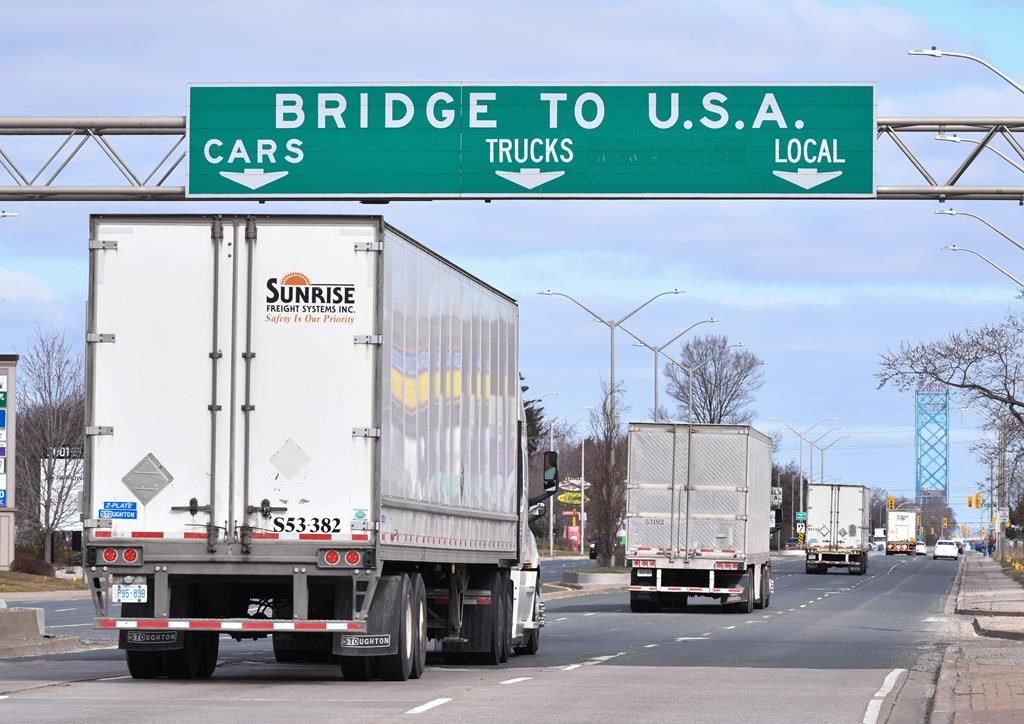Michigan Gov. Gretchen Whitmer has crossed out a provision, tucked into a COVID relief bill, that would have allowed hazmat trucks on the Ambassador Bridge for the first time in 91 years.
The hazardous materials provision was one of 11 provisions subjected to line item vetoes as Whitmer signed Enrolled Senate Bill 748 on Tuesday morning
“It’s all stricken out and Whitmer’s signature is right after it,” MP Brian Masse said later in the day after receiving an emailed copy of the signed bill. “The governor has fixed the problem.”
Masse rang the alarm bells last week after learning that the provision had been included in the bill — intended to provide financial help to many Michiganders suffering due to COVID restrictions — and passed by the state senate the previous Friday. His letter alerting Canada’s Transport Minister Marc Garneau of the surprise change to regulations forbidding hazardous materials on the bridge brought an immediate response. Transport Canada officials met the next day with officials representing Whitmer, who still had to sign the bill.
“I really give a lot of credit to Brian and the mayor (Drew Dilkens) for speaking out on this so quickly, because it was timed to be at a time that was very inconvenient for everybody, in the middle of the holidays and kind of in the dark of night,” said Gregg Ward, owner of the Detroit-Windsor Truck Ferry, which is permitted to transport trucks carrying hazardous materials across the river.
The issue only came to light when Michigan state Sen. Stephanie Chang (D — Detroit), who represents neighbourhoods around the Ambassador Bridge, discovered the Ambassador Bridge provision — allowing certain hazardous materials — in the bill and voted against it, despite the bill’s overall good intent.
“Allowing these types of hazardous materials to be transported across the Ambassador Bridge — a bridge that is over 90 years old, not up to the same level of inspections, traffic safety features, spill containment, or fire suppression systems needed to protect my residents’ safety — is downright dangerous,” Chang wrote in a commentary published last week in the Detroit Free Press, blaming Republican politicians for adding a provision that had nothing to do with COVID relief.
A provision in a recent COVID-19 relief bill that would have allowed hazardous materials on the Ambassador Bridge was crossed out in a line-item veto by Michigan Gov. Gretchen Whitmer on Tuesday, Dec. 29, 2020. Photo by Office of Gov. Gretchen Whitmer /Windsor Star
Ward and Masse both say that a crash on the bridge involving hazmat trucks could be an environmental, public safety and economic disaster. Because of the lack of chemical containment and fire suppression features on the 1929 bridge, a crash could result in spillage into the river, contamination of neighbourhoods and the shutdown of the bridge for a prolonged period. That kind of disruption of truck traffic could decimate the auto industry as well as the supply of goods across the border, they say.
The under-construction Gordie Howe International Bridge— expected to open in four years — has been designed to handle hazmat trucks.
An attempt to reach an Ambassador Bridge spokesman Tuesday afternoon was not successful.
Ward said that despite the apparent victory in Lansing on Tuesday, it’s not time for a victory lap.
The Ambassador Bridge has invested a lot of money in lobbying, “so I don’t think they’ll crawl off and accept defeat,” he said.
“I’m sure there will be more to come as there always is with the Ambassador Bridge,” he said. “But it’s great to show that when people come together to protect the community it can actually happen.”


